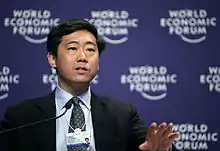David Daokui Li
David Daokui Li (Chinese: 李稻葵; pinyin: Lǐ Dàokúi; born 1963) is the Mansfield Freeman Professor of Economics and director of the Center for China in the World Economy (CCWE) at Tsinghua University's School of Economics and Management (SEM). He teaches courses on economic transition, corporate finance, international economics, and China's economy. In 2013, he was appointed the founding dean of the Schwarzman Scholars program at Tsinghua.[1][2]

Li Daokui is a part of an academic trio that replaced Fan Gang to the Monetary Policy Committee of the People's Bank of China (PBOC), China's central bank.[3] He is a former member of the Chinese People's Political Consultative Conference.[2]
His childhood was spent in Sichuan province, as a result of his parents being displaced to the countryside during the Cultural Revolution. He currently lives in Beijing with his wife and two children. He is a member of the 1985 inaugural class of Tsinghua's SEM, and studied abroad immediately following his graduation. A student of economic-transition scholars Eric Maskin, Andrei Shleifer, and János Kornai, Li received his Ph.D. in Economics from Harvard University in 1992. His current research interests are China's macroeconomy, economic development models, international comparisons of economic growth, and China's need to pursue a development pattern fitting with its large economic status.
He has also held the following positions: visiting scholar at the Center for International Development (CID) of the Harvard Kennedy School (1986), assistant professor at the University of Michigan-Ann Arbor, research fellow at Hoover Institute of the Stanford University, and professor and deputy director of the Economic Development Research Center of Hong Kong University of Science and Technology.
Li has also served as the editor for the Journal of Comparative Economics from 2000 to 2003 and the Economics Bulletin, as well as being named an honorary professor at Sichuan University and Nankai University. He returned to China in 2004 to teach at his alma mater, Tsinghua, and to serve as head of the Center for China in the World Economy research center.
In 2016, he was still a Chinese central bank's monetary policy committee.[4] He was succeeded by Dingo Xu on the board of JD.com in 2018.[5] In 2018, he presented for the Academic Center for Chinese Economic Practice and Thinking (ACCEPT) a report by titled "Economic Lessons Learned from China's Forty Years of Reform and Opening-Up".[6] He has written op-eds for The Wall Street Journal on topics like the Asia Infrastructure Investment Bank.[7]
In August 2020, Li stated China could restrict exports of medicine to the U.S. in response to American technology export restrictions on China.[8]
Select research papers
- Cornelli, Francesca; Li, David D. "Risk arbitrage in takeovers". Review of Financial Studies, 2002, vol. 15, issue 3, pages 837-868
- Bai, Chong-En; Li, David D.; Qian, Yingyi; Wang, Yijiang. "Financial repression and optimal taxation". Economics Letters, February, 2001, vol. 70, issue 2, pages 245-251
- Bai, Chong-En; Li, David D.; Tao, Zhigang; Wang, Yijiang. "A multitask theory of state enterprise reform". Journal of Comparative Economics, December, 2000, vol. 28, issue 4, pages 716-738
- Gordon, Roger H.; Bai, Chong-En; Li, David D. "Efficiency losses from tax distortions vs. government control". European Economic Review, April, 1999, Vol. 43, Issue 4–6, pages 1095–1103
- Li, David D.; Li, Shan. "An agency theory of the bankruptcy law". International Review of Economics and Finance, January, 1999, vol. 8, issue 1, pages 1–24
- Gordon, Roger H.; Li, David D. "The effects of wage distortions on the transition: Theory and evidence from China". European Economic Review, January, 1999, vol. 43, issue 1, pages 163-183
- Li, David D.; Liang, Minsong. "Causes of the soft budget constraint: Evidence on three explanations". Journal of Comparative Economics, March, 1998, vol. 26, issue 1, pages 104-116
- Li, David D.; "Changing incentives of the Chinese bureaucracy". American Economic Review, 1998, vol. 88, issue 2, pages 393-97
- Li, David D. "Insider control and the soft budget constraint: A simple theory". Economics Letters, December, 1998, vol. 61, issue 3, pages 307-311
- Cornelli, Francesca; Li, David D. "Large shareholders, private benefits of control, and optimal schemes of privatization". RAND Journal of Economics, 1997, vol. 28, issue 4, pages 585-604
- Li, David D. "A theory of ambiguous property rights in transition economies: The case of the Chinese non-state sector". Journal of Comparative Economics, 1996, vol.23, issue 1, pages 1–19
- Li, David D.; Li, Shan. "A theory of corporate scope and financial structure". Journal of Finance, 1996, vol. 51, issue 2, pages 691-709
References
- Bradsher, Keith (2013-04-20). "$300 Million Scholarship for Study in China Signals a New Focus". The New York Times. ISSN 0362-4331. Archived from the original on 2019-11-06. Retrieved 2020-08-27.
- Allen-Ebrahimian, Bethany (January 11, 2020). "The Moral Hazard of Dealing With China: Academic institutions must grapple with the question of when engagement becomes complicity". The Atlantic. Archived from the original on 15 January 2020. Retrieved 27 August 2020.
- "China Names Three Economists to PBOC Monetary Policy Committee" March 29, 2010, Bloomberg
- Keith Bradsher (August 12, 2016). "Trillions in Murky Investments Could Rock China's Economy". The New York Times. Retrieved October 6, 2020 – via www.nytimes.com.
- Prachi Singh (May 22, 2018). "Professor Dingbo Xu appointed to JD.com's board of directors". www.fashionunited.com. Fashion United. Retrieved May 22, 2018.
- "Experience over past four decades gives optimism for the future". www.chinadaily.com. China Daily. December 11, 2018. Retrieved October 6, 2020.
- David Daokui Li (March 30, 2015). "A Powerful Message From America's Frustrated Allies". The Wall Street Journal. Retrieved October 6, 2020 – via www.wsj.com.
- Zhou, Cissy (26 August 2020). "China could weaponise drug exports to retaliate against US chip restrictions, Beijing adviser says". South China Morning Post. Archived from the original on 27 August 2020. Retrieved 27 August 2020.